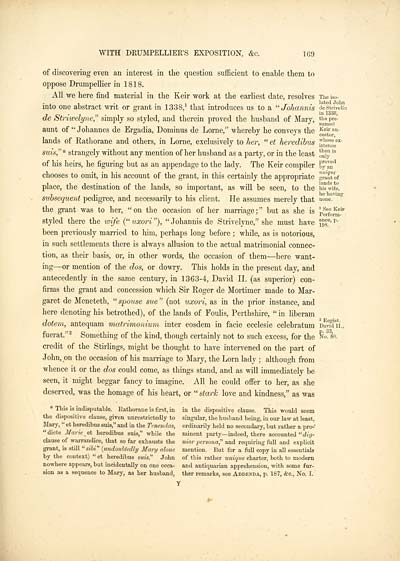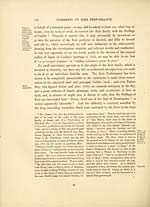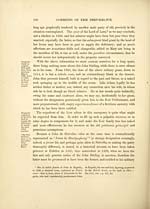Download files
Complete book:
Individual page:
Thumbnail gallery: Grid view | List view

WITH DRUMPELLIER'S EXPOSITION, &c. 169
of discovering even an interest in the question sufficient to enable them to
oppose DrumpeUier in 1818.
All we here find material in the Keir work at the earliest date, resolves The iso-
into one abstract writ or grant in 1338,' that introduces us to a "Johannis ;iestriveHn
J cf ' 7 jy ' 1 ^^ 1338,
de btriiveLyne, simply so styled, and therein proved the husband of Mary, t^e pre-
aunt of " Johannes de Ergadia, Dominus de Lome," whereby he conveys the p^ ''"■
lands of Rathorane and others, in Lome, exclusively to her, " et heredibus Y^°^^^^'
suis,"* strangely without any mention of her husband as a party, or in the least on?" '^
of his heirs, he figuring but as an appendage to the lady. The Keir compiler b^In**
chooses to omit, in his account of the grant, in this certainly the appropriate gSnt o£
place, the destination of the lands, so important, as will be seen, to the Ms wife,
subsequent pedigree, and necessarily to his client. He assumes merely that nonJ!"""^
the gi-ant was to her, " on the occasion of her marriage ; " but as she is per/or^!'"
styled there the ivife (" uxori "), " .Johannis de Strivelyne," she must have 193"' ^■
been pre^dously married to him, perhaps long before ; while, as is notorious,
in such settlements there is always allusion to the actual matrimonial connec-
tion, as their basis, or, in other words, the occasion of them — here want-
ing — or mention of the dos, or dowry. This holds in the present day, and
antecedently in the same century, in 1363-4, David IL (as superior) con-
firms the grant and concession which Sir Roger de Mortimer made to Mar-
garet de Mcneteth, " sjioiise sue " (not uxori, as in the prior instance, and
here denoting his betrothed), of the lands of Fouhs, Perthshire, " in liberam
dotem, antequam matrimonium inter eosdem in facie ecclesie celebratum Da-ridu.,
p. 33,
fuerat."^ Something of the kind, though certainly not to such excess, for the No.
credit of the Stirlings, might be thought to have intervened on the part of
John, on the occasion of his maiTiage to Mary, the Lorn lady ; although from
whence it or the dos could come, as things stand, and as will immediately be
seen, it might beggar fancy to imagine. All he could offer to her, as she
deserved, was the homage of his heart, or " starh love and kmdness," as was
* This is indisputable. Eathorane is first, in in the dispositive clause. This would seem
the dispositive clause, given unrestrictedly to singular, the husband being, in our law at least,
Mary, " et heredibus suis," and in the Tmewlas, ordinarily held no secondary, but rather a pro-'
"dicte Marie Qt heredibus suis," while the minent party— indeed, there accounted "c£i(?-
clause of warrandice, that so far exhausts the nior j^rsona,"' and requiring full and explicit
grant, is still '' sihi" {undouUedly Mary alone mention. But for a full copy in all essentials
by the context) " et heredibus smw." John of this rather unique charter, both to modern
nowhere appears, but incidentally on one occa- and antiquarian apprehension, with some fur-
sion as a sequence to Mary, as her husband, ther remai-ks, see Addenda, p. 187, (fcc. No. I.
80.
of discovering even an interest in the question sufficient to enable them to
oppose DrumpeUier in 1818.
All we here find material in the Keir work at the earliest date, resolves The iso-
into one abstract writ or grant in 1338,' that introduces us to a "Johannis ;iestriveHn
J cf ' 7 jy ' 1 ^^ 1338,
de btriiveLyne, simply so styled, and therein proved the husband of Mary, t^e pre-
aunt of " Johannes de Ergadia, Dominus de Lome," whereby he conveys the p^ ''"■
lands of Rathorane and others, in Lome, exclusively to her, " et heredibus Y^°^^^^'
suis,"* strangely without any mention of her husband as a party, or in the least on?" '^
of his heirs, he figuring but as an appendage to the lady. The Keir compiler b^In**
chooses to omit, in his account of the grant, in this certainly the appropriate gSnt o£
place, the destination of the lands, so important, as will be seen, to the Ms wife,
subsequent pedigree, and necessarily to his client. He assumes merely that nonJ!"""^
the gi-ant was to her, " on the occasion of her marriage ; " but as she is per/or^!'"
styled there the ivife (" uxori "), " .Johannis de Strivelyne," she must have 193"' ^■
been pre^dously married to him, perhaps long before ; while, as is notorious,
in such settlements there is always allusion to the actual matrimonial connec-
tion, as their basis, or, in other words, the occasion of them — here want-
ing — or mention of the dos, or dowry. This holds in the present day, and
antecedently in the same century, in 1363-4, David IL (as superior) con-
firms the grant and concession which Sir Roger de Mortimer made to Mar-
garet de Mcneteth, " sjioiise sue " (not uxori, as in the prior instance, and
here denoting his betrothed), of the lands of Fouhs, Perthshire, " in liberam
dotem, antequam matrimonium inter eosdem in facie ecclesie celebratum Da-ridu.,
p. 33,
fuerat."^ Something of the kind, though certainly not to such excess, for the No.
credit of the Stirlings, might be thought to have intervened on the part of
John, on the occasion of his maiTiage to Mary, the Lorn lady ; although from
whence it or the dos could come, as things stand, and as will immediately be
seen, it might beggar fancy to imagine. All he could offer to her, as she
deserved, was the homage of his heart, or " starh love and kmdness," as was
* This is indisputable. Eathorane is first, in in the dispositive clause. This would seem
the dispositive clause, given unrestrictedly to singular, the husband being, in our law at least,
Mary, " et heredibus suis," and in the Tmewlas, ordinarily held no secondary, but rather a pro-'
"dicte Marie Qt heredibus suis," while the minent party— indeed, there accounted "c£i(?-
clause of warrandice, that so far exhausts the nior j^rsona,"' and requiring full and explicit
grant, is still '' sihi" {undouUedly Mary alone mention. But for a full copy in all essentials
by the context) " et heredibus smw." John of this rather unique charter, both to modern
nowhere appears, but incidentally on one occa- and antiquarian apprehension, with some fur-
sion as a sequence to Mary, as her husband, ther remai-ks, see Addenda, p. 187, (fcc. No. I.
80.
Set display mode to:
![]() Universal Viewer |
Universal Viewer | ![]() Mirador |
Large image | Transcription
Mirador |
Large image | Transcription
Images and transcriptions on this page, including medium image downloads, may be used under the Creative Commons Attribution 4.0 International Licence unless otherwise stated. ![]()
| Permanent URL | https://digital.nls.uk/95372819 |
|---|
| Description | A selection of almost 400 printed items relating to the history of Scottish families, mostly dating from the 19th and early 20th centuries. Includes memoirs, genealogies and clan histories, with a few produced by emigrant families. The earliest family history goes back to AD 916. |
|---|

